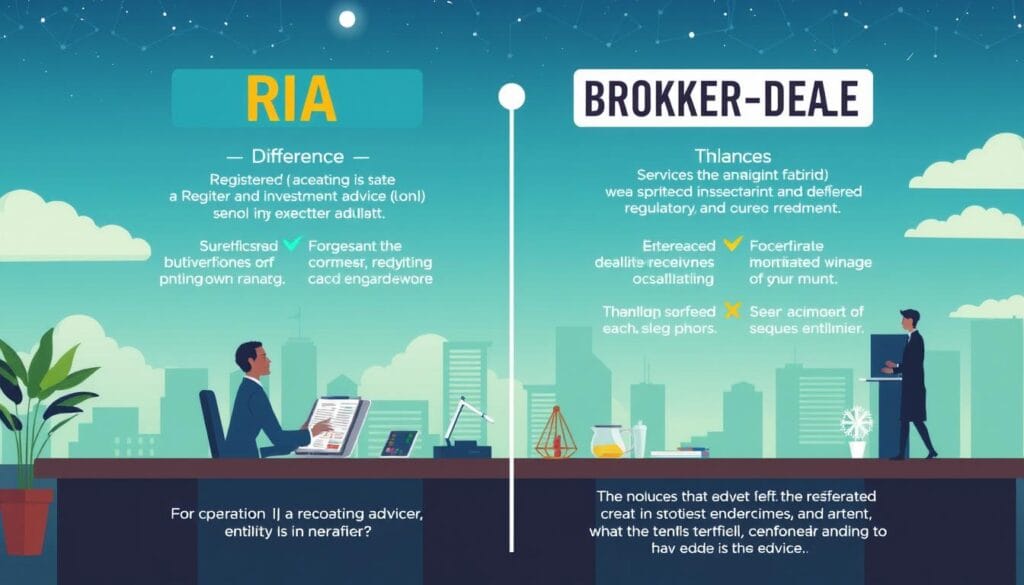As seniors navigate the complexities of retirement planning, they require guidance from professionals who can help manage their investment portfolios effectively. A staggering number of seniors face financial challenges that demand personalized strategies tailored to their specific needs and goals.
Registered Investment Advisors (RIAs) play a crucial role in providing seniors with the necessary guidance to manage their finances. By operating under a fiduciary standard, RIA professionals are legally obligated to act in the best interests of their clients, ensuring that their investment decisions align with the clients’ retirement objectives.
For those looking to start investing, exploring top IRA accounts can be a viable option. More information on this can be found at top IRA accounts for beginners.
Key Takeaways
- RIAs provide specialized financial guidance for seniors navigating retirement planning.
- RIA professionals operate under a fiduciary standard, prioritizing clients’ interests.
- Seniors face unique financial challenges requiring personalized investment strategies.
- A dedicated team of RIA professionals helps seniors manage their portfolios.
- Understanding RIA advisors is crucial for seniors seeking comprehensive financial guidance.
Understanding RIA Advisors and Their Fiduciary Duty

The fiduciary duty of RIA advisors sets them apart from other financial professionals in the investment industry. RIA advisors are legally bound to act in the best interest of their clients.
- RIA advisors operate under a legal fiduciary duty that requires them to put their clients’ interests ahead of their own in all investment decisions and recommendations.
- Unlike other financial professionals, RIAs must disclose all potential conflicts of interest and provide transparent information about their business practices and compensation.
- The fiduciary standard is established by the Investment Advisers Act of 1940, creating a higher level of accountability for RIA firm representatives.
- RIAs must provide ongoing monitoring of clients’ accounts and regularly review investment strategies to ensure continued alignment with clients’ financial objectives.
- Seniors benefit from this fiduciary relationship as it provides an additional layer of protection for their retirement assets and ensures recommendations are made solely in their interest.
By adhering to this fiduciary standard, RIA advisors demonstrate their commitment to serving their clients’ needs above their own business interests.
Why Seniors Should Consider RIA Advisors

Seniors can greatly benefit from working with Registered Investment Advisors (RIAs) who offer comprehensive investment management services tailored to their unique needs in retirement.
RIA advisors provide personalized financial planning that addresses specific life stage concerns, including healthcare costs and legacy planning, ensuring that seniors’ life goals are met.
By considering the entire financial picture, RIA advisors offer holistic solutions that align with seniors’ long-term goals and risk tolerance, providing services that extend to families and helping with wealth transfer strategies.
For more information on maximizing your retirement benefits, visit our guide on maximizing Social Security benefits.
The Difference Between RIA Advisors and Traditional Financial Advisors

Seniors must understand that RIA advisors operate under a different standard than traditional financial advisors. While RIA advisors are bound by a fiduciary duty to act in their clients’ best interests, traditional advisors often follow a “suitability” standard.
- RIA advisors operate under a fiduciary standard requiring them to act in their clients’ best interests.
- Traditional financial advisors may be compensated through commissions, potentially creating conflicts of interest.
- RIA firms provide transparent investment management services with clear disclosure of fees.
- Seniors receive comprehensive advice from RIA advisors who consider their entire financial situation.
- Traditional advisors may be limited to recommending certain products, while independent RIAs provide objective advice.
- The regulatory oversight differs significantly between RIA advisors and traditional financial advisors.
- Client relationships with RIA advisors tend to be more consultative and ongoing.
By understanding these differences, seniors can make informed decisions about their financial guidance.
Key Financial Services RIA Advisors Provide for Seniors

RIA advisors specialize in providing seniors with comprehensive financial planning and investment management services tailored to their unique needs. These services are designed to help seniors achieve their retirement goals and maintain financial stability.
The financial services provided by RIA advisors include:
- RIA advisors deliver comprehensive investment management services tailored specifically to seniors’ needs, including portfolio construction focused on income generation and capital preservation.
- Retirement income planning helps seniors create sustainable withdrawal strategies to ensure their wealth lasts throughout their lifetime.
- Portfolio management services include regular rebalancing and adjustments based on changing market conditions and client needs.
- Estate planning guidance helps seniors establish effective wealth transfer strategies to benefit families and charitable interests.
- RIA advisors coordinate with other professionals like attorneys and CPAs to create comprehensive planning solutions.
- Tax-efficient investment strategies help seniors minimize tax burdens on retirement income and eventual estate transfers.
- Long-term care planning services address one of seniors’ most significant financial concerns.
- Social Security optimization strategies help clients maximize this important retirement income source.
- Healthcare cost planning assists seniors in preparing for medical expenses not covered by Medicare.
Retirement Income Planning
Effective retirement income planning is crucial for seniors to ensure their financial stability. RIA advisors help create sustainable withdrawal strategies that make the most of their retirement savings. For more information on optimizing retirement savings, you can visit top Roth IRA providers.
Estate Planning Guidance
Estate planning is another critical service provided by RIA advisors. They help seniors establish effective wealth transfer strategies that benefit their families and charitable interests. This guidance ensures that seniors’ assets are distributed according to their wishes.
How RIA Advisors Are Compensated

Understanding how RIA advisors are compensated is crucial for seniors seeking financial guidance. RIA advisors typically charge fees based on a percentage of assets under management (AUM), usually around 1% annually. This fee structure aligns the advisor’s interest with the client’s portfolio growth.
The management fee typically covers comprehensive services including investment guidance and financial planning. Fee transparency is a hallmark of the RIA model, with all costs clearly disclosed to clients upfront.
| Fee Structure | Description | Benefits |
|---|---|---|
| Percentage of AUM | Fees based on assets under management | Aligns advisor’s interest with client’s portfolio growth |
| Fixed Fees | Flat rate for specific services | Predictable costs for clients |
| Hourly/Project-Based | Fees for specific projects or hourly work | Flexible pricing for various client needs |
Finding the Right RIA Advisor for Your Retirement Needs

Choosing the right RIA advisor is crucial for a secure retirement. To achieve this, consider several key factors when evaluating potential advisors. Their experience working with seniors and understanding of retirement-specific planning challenges are paramount.
When assessing RIA advisors, consider their team structure and whether they have specialists in areas relevant to your wealth management needs. Verifying their credentials, including professional designations, is also essential.
Questions to Ask When Interviewing Potential Advisors
Ask detailed questions about their experience, approach to client service, and how they measure success. Request references from current clients who have worked with the advisor for multiple years to gauge their satisfaction and the advisor’s ability to meet client goals over time.
Understanding the advisor’s communication style and frequency is vital to ensure it aligns with your preferences. Evaluating the firm’s succession plan can provide assurance of continuity of service throughout your retirement years.
For more information on retirement income strategies, visit our guide on best retirement income strategies for 2025.
The Importance of Experience in Senior-Focused Financial Planning
https://www.youtube.com/watch?v=Bn3QwYcTTsA&pp=ygUJI29mY2hmY2l0
When it comes to financial planning for seniors, the importance of experience cannot be overstated. Experienced advisors bring a depth of knowledge and insight that is crucial for navigating the complexities of retirement planning.
Seasoned financial professionals understand the psychological aspects of transitioning from wealth accumulation to distribution. They are adept at providing specialized advice on complex issues such as required minimum distributions, pension options, and healthcare planning. This expertise is invaluable in helping seniors make informed decisions about their financial resources.
Experienced advisors have guided their clients through various market cycles, developing portfolio management strategies that balance growth with protection. Their extensive experience working with seniors enables them to anticipate common challenges and proactively address them, ensuring a smoother transition into retirement.
The success of retirement planning often depends on the advisor’s ability to adapt strategies as clients age and their needs evolve. For instance, a well-experienced advisor can provide insights into understanding advisor credentials and how they impact the quality of service.
| Experience Level | Key Benefits | Impact on Clients |
|---|---|---|
| Highly Experienced | Deep understanding of retirement transitions, specialized advice on complex issues | Better equipped to handle unique challenges, proactive problem-solving |
| Moderately Experienced | Knowledgeable about various financial products, able to develop portfolio management strategies | Capable of providing balanced advice, though may lack the depth of highly experienced advisors |
| Less Experienced | Limited exposure to different market cycles and client needs | May struggle to provide comprehensive advice, potentially leading to oversights in planning |
For seniors looking to leverage the latest advancements in financial planning, considering AI-powered financial tools can be beneficial. These tools, combined with the experience of a seasoned advisor, can enhance the retirement planning process.
In conclusion, the importance of experience in senior-focused financial planning cannot be overstated. It is a critical factor that contributes to the success of retirement planning, providing seniors with the guidance and support they need to navigate their financial lives effectively.
Common Financial Concerns for Seniors and How RIA Advisors Address Them
As individuals age, their financial needs evolve, and RIA advisors provide tailored solutions to address these changes. Seniors face a myriad of financial concerns, from outliving their savings to managing healthcare costs and navigating market volatility.
RIA advisors help seniors address their primary concern of outliving their savings through sustainable withdrawal strategies and appropriate investment allocations. They also provide guidance on healthcare cost management, a critical component of retirement planning.
- Market volatility concerns addressed through diversified portfolio construction
- Tax-efficient withdrawal strategies to maximize retirement income
- Estate planning and wealth transfer strategies to achieve family goals
- Cognitive decline concerns addressed through proper legal documentation
- Long-term care planning solutions to protect assets from healthcare costs
| Financial Concern | RIA Advisor Solution |
|---|---|
| Outliving Savings | Sustainable Withdrawal Strategies |
| Market Volatility | Diversified Portfolio Construction |
| Healthcare Costs | Long-term Care Planning |
By leveraging the expertise of RIA advisors, seniors can achieve their financial goals and secure their financial future. As
“The right financial advice can make all the difference in retirement.”
The RIA team approach ensures all aspects of a senior’s financial life are coordinated, providing comprehensive support as clients age and their needs evolve.
Conclusion: Securing Your Financial Future with RIA Advisors
Seniors seeking to secure their financial future can greatly benefit from partnering with a Registered Investment Advisor (RIA). By doing so, they gain access to expert investment guidance and comprehensive financial planning services tailored to their needs.
RIA advisors provide holistic planning that addresses all aspects of a senior’s financial life, ensuring a cohesive approach. This includes ongoing monitoring and adjustments to financial strategies, providing clients with peace of mind. By working with a fiduciary RIA firm, seniors can trust that their best interests are always the top priority.

